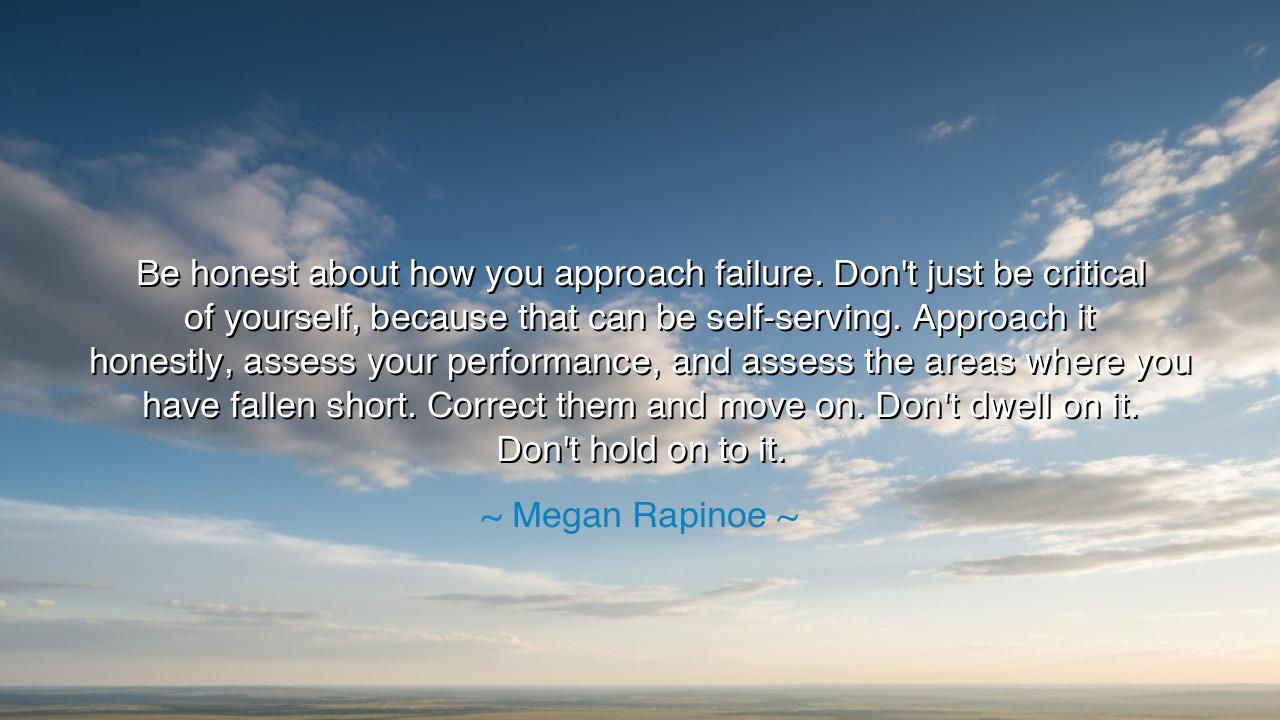
Be honest about how you approach failure. Don't just be critical
Be honest about how you approach failure. Don't just be critical of yourself, because that can be self-serving. Approach it honestly, assess your performance, and assess the areas where you have fallen short. Correct them and move on. Don't dwell on it. Don't hold on to it.






Host: The room is quiet, the evening light fading as the soft hum of the city outside continues its steady rhythm. The air feels calm, yet there’s a sense of anticipation in the space, as if the conversation about to unfold carries a weight of understanding. Jeeny sits at the table, her hands wrapped around a mug of tea, her gaze distant as she reflects on the day. Jack stands near the window, his arms crossed, looking out but clearly caught in thought.
Jeeny: (her voice soft, but filled with curiosity) “You ever think about how we deal with failure? It’s funny, because we often expect ourselves to be perfect, and when we fall short, it feels like we’re failing ourselves.”
Jack: (glancing over at her, his voice dry, but intrigued) “Failure’s one of those things that people rarely talk about openly. Everyone’s so quick to judge themselves, but it’s like we don’t always give ourselves the space to understand it.”
Jeeny: (nodding slowly, a small smile forming as she thinks about the idea) “I was reading something Megan Rapinoe said that made me think differently about failure. She said, ‘Be honest about how you approach failure. Don't just be critical of yourself, because that can be self-serving. Approach it honestly, assess your performance, and assess the areas where you have fallen short. Correct them and move on. Don't dwell on it. Don't hold on to it.’ It’s such a powerful way of thinking about failure, don’t you think?”
Jack: (pauses, his posture relaxing slightly as he processes the words) “So, you’re saying that instead of just beating ourselves up when we fail, we should accept it, analyze where we fell short, and then move forward without carrying that weight?”
Jeeny: (smiling more widely now, her voice calm, but filled with conviction) “Exactly. Megan Rapinoe is saying that the key to growth is in being honest with yourself about your failures. Don’t let shame or self-criticism cloud your ability to learn from it. Instead, see it for what it is—a lesson. And then, once you’ve learned from it, move on.”
Host: The room feels quieter now, as though the weight of the conversation is settling in. Jack stands still, his gaze turning inward as he considers the idea, the stillness around them deepening.
Jack: (his voice softer now, almost with a trace of realization) “I get it. It’s about treating failure as a tool, not an enemy. So many of us get stuck in the cycle of self-criticism, but that doesn’t help us move forward. Focusing on the areas we’ve fallen short, learning from them—that’s the key to making progress.”
Jeeny: (nodding gently, her eyes bright with understanding) “Exactly. Failure doesn’t define you. The way you respond to it—that’s what shapes who you are. It’s not about pretending it didn’t happen or ignoring it. It’s about being honest with yourself, figuring out what went wrong, and using that knowledge to move forward.”
Jack: (pauses for a moment, his expression thoughtful, then speaks with a touch of clarity) “It’s about letting go of the emotional weight. It’s not about holding on to failure—it’s about learning from it, correcting it, and letting it go. That’s how you grow, how you get better.”
Jeeny: (with a small, approving smile, her voice gentle, but filled with quiet strength) “Exactly. Don’t let failure hold you back. Use it to propel you forward. The longer you dwell on what went wrong, the harder it is to see what’s coming next.”
Host: The room feels lighter now, the air filled with a quiet realization that failure isn’t something to be feared or avoided—it’s something to be learned from, to be understood and then released. Jack stands a little straighter, as though the conversation has given him the clarity he needed to approach failure with a new mindset. Jeeny watches him, her smile warm with the satisfaction of a shared understanding.
Jack: (his voice gentler, almost with a trace of something like relief) “It’s funny, you know? We all fear failure, but when you start to see it as just another part of the process, it loses its grip on you. Maybe that’s how we really grow—not by avoiding mistakes, but by owning them and using them to keep moving.”
Jeeny: (nodding, her voice full of encouragement) “Exactly. Failure doesn’t have to be the end. It’s just a step along the way. And when we treat it like that, we can move forward with less fear and more confidence.”
Host: The evening deepens, and the world outside continues its rhythm, but inside, there is a quiet, shared understanding. The conversation lingers in the air, a reminder that failure is not something to fear, but to embrace—a tool for growth, a moment to learn, and an opportunity to move forward without holding on to the past.






AAdministratorAdministrator
Welcome, honored guests. Please leave a comment, we will respond soon